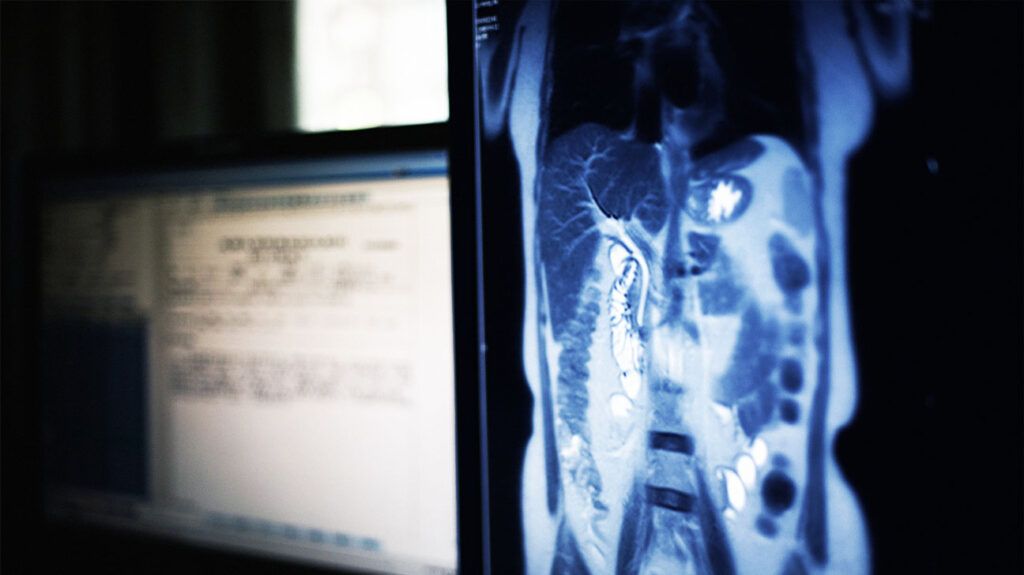Stomach cancer and stomach ulcer symptoms can be similar. However, both conditions typically have different causes. Both require prompt care using various treatment methods.
Stomach cancer and stomach ulcers are two distinct conditions. They develop due to different causes but can share similar symptoms. Both conditions may not cause any symptoms in their early stages.
People should always seek professional medical advice if they experience stomach cancer or stomach ulcer symptoms.
This article discusses what stomach cancer and stomach ulcers are and how their symptoms compare. It also looks at the causes and treatments for both conditions.

Stomach cancer is a condition where cells in a person’s stomach lining begin to grow abnormally.
There are several types of stomach cancer.
Another name for stomach cancer is gastric cancer.
A stomach ulcer is a sore
Other names for stomach ulcers are peptic ulcers, duodenal ulcers, or peptic ulcer disease.
Symptoms of stomach cancer and stomach ulcers may not differ.
In the early stages of both conditions, people may not have any symptoms. If they do experience symptoms, these may
- nausea
- heartburn
- loss of appetite
- feeling bloated after eating
- indigestion and stomach discomfort
In their advanced stages, both conditions can cause unique symptoms. For example, people with advanced stomach cancer may experience:
- unexplained weight loss
- jaundice, or a yellowing of the eyes and skin
- trouble swallowing
- ascites, or a build up of fluid in the abdomen
Both conditions cause stomach pain. However, people with stomach ulcers
- is dull or burning
- may come and go over time
- happens at night or when their stomach is empty
- goes away for a short time after eating or is worse when eating
People should also seek immediate medical attention if they notice any of the following symptoms of stomach ulcer complications:
- black or tarry stool
- red or maroon blood mixed with their stool
- red blood in their vomit
- vomit that looks like coffee grounds
- sudden, sharp, or severe abdominal pain that does not go away
- dizziness
- fainting
- a rapid pulse or other symptoms of shock
- a change in or worsening of other stomach ulcer symptoms
Complications of stomach ulcers are uncommon but can be serious.
However, stomach cancer does not usually lead to symptoms until it has spread to other areas of the body. Similarly, people with stomach ulcers may not develop symptoms until an ulcer causes complications.
People should always seek professional medical advice if they experience symptoms of either condition. Healthcare professionals can diagnose both conditions using medical testing and recommend appropriate treatment.
A note about sex and gender
Sex and gender exist on spectrums. This article will use the terms “male,” “female,” or both to refer to sex assigned at birth. Click here to learn more.
Changes to how stomach cells function
Stomach cancer often affects people ages 65 years and older. Other factors that increase a person’s risk of stomach cancer include:
- having a past Helicobacter pylori (H. pylori) infection
- being male
- having experienced stomach inflammation in the past
- smoking
- having a family history of stomach cancer
- consuming a lot of salted, smoked, or pickled foods
The most
- H. pylori infections: H. pylori infections are common and usually harmless. However, they can sometimes cause stomach ulcers. Scientists are not yet sure why they affect some people more than others.
- Nonsteroidal anti-inflammatory drugs (NSAIDs): NSAIDs are medications for pain, fever, or swelling. Long-term use of NSAIDs may cause people to develop stomach ulcers. Common NSAIDs include aspirin and ibuprofen.
Both causes can lead to stomach acid damaging the walls of the stomach or duodenum. This can cause stomach ulcers.
Experiencing stress or eating spicy foods cannot cause stomach ulcers. However, they may make symptoms worse.
There are several types of treatment for stomach cancer. Healthcare professionals
- stage of stomach cancer
- overall health
- personal preferences
Doctors may recommend a person receives a combination of treatments, which can include:
- Endoscopic mucosal resection: In this procedure, surgeons use a long flexible instrument called an endoscope to remove cancer from a person’s digestive tract lining.
- Surgery: This aims to remove all or part of the stomach or to help manage cancer symptoms.
- Radiation therapy: Radiation therapy uses high energy radiation to destroy cancer cells or to stop them from growing.
- Chemotherapy: Chemotherapy uses drugs to destroy cancer cells or prevent them from growing.
- Targeted therapy: Targeted therapy uses drugs or other substances to identify and attack specific cancer cells.
- Immunotherapy: Immunotherapy involves drugs that help a person’s immune system fight cancer.
Stomach ulcers typically get worse without treatment. Healthcare professionals
Treatments for stomach ulcers include medications to reduce a person’s stomach acid production or to kill the H. pylori bacteria.
Medications to reduce stomach acid include proton pump inhibitors (PPIs) and H2 receptor blockers, also called H2 receptor antagonists.
People may require surgery if their stomach ulcer does not heal or if they experience complications.
Stomach cancer and stomach ulcers can cause similar symptoms but have different causes and treatments. People may also experience no symptoms in the early stages of both conditions.
Because their symptoms can be similar, people should always seek professional medical advice if they suspect either condition.
